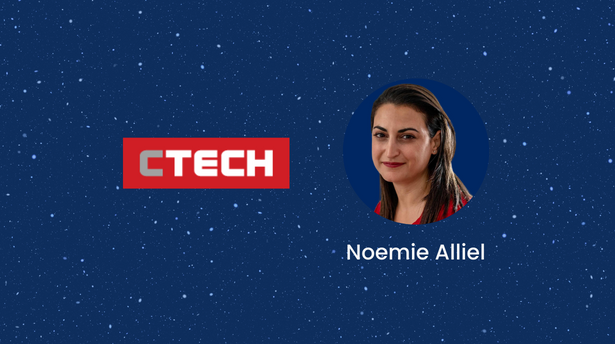Aug 19th2022
Noemie Alliel, Israel Managing Director interviewed on CTECH

“People are starting to see space as a place to travel to, invest in, it’s no longer futuristic”
Starburst Aerospace has big plans for the future: Investing in Israel’s “next SpaceX” and other promising startups to pave way for the future, says Israel Managing Director Noemie Alliel
The Israeli space tech industry is slated for takeoff, with a multitude of new startups popping up as well as government grants of astronomical proportions, such as the recently announced NIS 600 million ($176 million) toward space tech R&D. And this is all in a field that up until a few years ago, many considered too futuristic. Space tech is vying for a position as one of the leading industries over the next decade, and costs of technology have plummeted. It’s no longer an arena where only the big players are welcome, but is open to young startups as well. In the fourth quarter of 2021 alone, private investments reached a record high of $40 billion.
Starburst Aerospace, an aerospace and defense accelerator geared toward connecting startups with investment bodies, recently launched its Astra accelerator program, to attract local Israeli talent to its mentoring program, helping them partner with corporations, raise funding, and launch their product to market. Starburst also has ambitious plans for the future: it wants to transform Israel’s fledgling space tech industry into a global powerhouse. Aside from Astra, the group has a built-in VC arm, which invests in some of its portfolio companies.
Investing in space
Starburst began a decade ago, and was the brainchild of founder and current CEO Francois Chopard, originally based in France. It has four different bases, including in Los Angeles, Paris, Singapore, and now Israel. Currently, it employs 80 people worldwide, and possesses an impressive database of 12,000 space tech startups. “Investing in space is hard, many will tell you that. But our mission is to support promising entrepreneurs and help them create the future of this industry,” Noemie Alliel, Managing Director of Israel’s Starburst Aerospace branch told CTech in an interview. The group invests in 21 different space-oriented verticals, matching big corporations who need contractors with small startups looking to launch their product to market and get funding.
“This creates a win-win deal on both sides,” Alliel explained. “Startups get money for their technology and generate sales, while big companies gain a design partner that can give them valuable feedback and this also helps the startups raise their next round.” And Starburst is now in the midst of fundraising too. “Once startups have enough traction, we help them reach their Series A rounds,” she said. Alternatively, if they are only at the pre-seed stage, Starburst’s Astra uses its short three-month bootcamp program to help them create their MVP (minimum viable product). Following initial fundraising, it then holds an extended 12-month accelerator program to connect them with relevant industry players, and assists in securing deals and establishing pilots, offering its consulting services and advice. “After that, we either invest with our venture arm, U.S.-based Starburst Ventures, or persuade other investment bodies to get on board.”
So far, Astra has three new startups on board, who recently were accepted in early June to its fast-paced program. Those include Tehiru Technologies, which plans on rebuilding reusable rockets that can carry smaller payloads (think an Israeli-version of SpaceX); CrystalEn Semiconductor, which plans on growing single-crystal diamonds to build next-generation materials for the semiconductor industry for use in satellites and solar panels; and lastly, CSpace, which is creating a satellite-based public planetary observation center equipped with nanosatellite telescopes for public space observation and astrophysics research.
“These are all big bets, and may seem risky, but if they survive, they’ll be very rewarding,” Alliel added. “At Starburst, we understand that space is hard. Startups have limited time to pitch their proof of concept, convince investors to get onboard and raise capital, and begin sales. Our job is to make their time to market shorter, because we’ve built relationships with big companies over the past few years and can support them while they can just focus on developing their products.” In Israel, Starburst has partnered with Israel Aerospace Industries; so far the group works with 15 large companies and numerous local startups, while co-investing with other entities in its portfolio companies.
MORE TO READ

